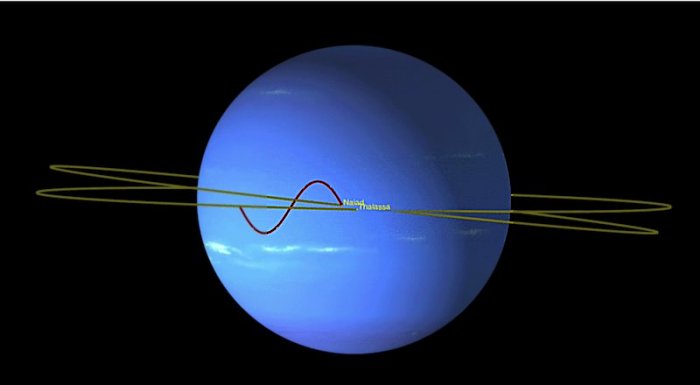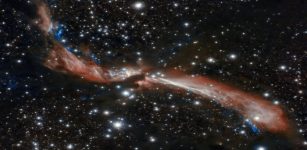Neptune Moons Naiad And Thalassa In Odd ‘Dance of Avoidance’
Eddie Gonzales Jr. – MessageToEagle.com – The strange orbits that carry Neptune’s two innermost tiny moons Naiad and Thalassa, are unique and astronomers dubbed their behavior a “dance of avoidance”.
Although the dance may appear odd, it keeps the orbits stable, researchers said.
 The odd orbits of Neptune’s inner moons Naiad and Thalassa enable them to avoid each other as they race around the planet. Credit: NASA/JPL-Caltech
The odd orbits of Neptune’s inner moons Naiad and Thalassa enable them to avoid each other as they race around the planet. Credit: NASA/JPL-Caltech
The two are true partners, orbiting only about 1,150 miles (1,850 kilometers) apart. But they never get that close to each other; Naiad’s orbit is tilted and perfectly timed.
Every time it passes the slower-moving Thalassa, the two are about 2,200 miles (3,540 kilometers) apart.
Neptune has 14 confirmed moons. Neso, the farthest-flung of them, orbits in a wildly elliptical loop that carries it nearly 46 million miles (74 million kilometers) away from the planet and takes 27 years to complete.
Naiad and Thalassa are small and shaped like Tic Tacs, spanning only about 60 miles (100 kilometers) in length. They are two of Neptune’s seven inner moons, part of a closely packed system that is interwoven with faint rings.
Naiad swirls around the ice giant every seven hours, while Thalassa, on the outside track, takes seven and a half hours. An observer sitting on Thalassa would see Naiad in an orbit that varies wildly in a zigzag pattern, passing by twice from above and then twice from below. This up, up, down, down pattern, repeats every time Naiad gains four laps on Thalassa.
“We refer to this repeating pattern as a resonance,” said Marina Brozovic, an expert in solar system dynamics at NASA’s Jet Propulsion Laboratory in Pasadena, California, and the lead author of the new paper, which was published Nov. 13 in Icarus.
“There are many different types of ‘dances’ that planets, moons, and asteroids can follow, but this one has never been seen before.”
So how did they end up together – but apart? “We suspect that Naiad was kicked into its tilted orbit by an earlier interaction with one of Neptune’s other inner moons,” Brozovic said.
“Only later, after its orbital tilt was established, could Naiad settle into this unusual resonance with Thalassa.”
Written by Eddie Gonzales Jr. – MessageToEagle.com Staff










